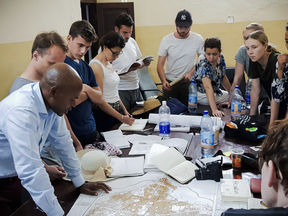Coaching for goal setting and time management in humanitarian architecture

In a complex field, such as humanitarian architecture, any project may expand in unexpected directions and dimensions. This can happen despite of the best plans and intentions. How can we make sure that projects stay feasible, attainable within the time limits, and that they still produce the best possible outcome? In the WiT Programme, experienced practitioners and researchers of humanitarian architecture share their valuable learnings from decades of experience. In addition to this, the course offers a life-coaching based approach to goal setting and time management.
Setting goals from values
In life coaching, goal setting always starts from your own values and interests. Exploring your values is a deep exercise that increases self-awareness. When you recognize your own values, you can also evaluate their relation to the field you work in. And when your goals are linked to your personal values, you have a strong base that helps to motivate you. This is especially important in challenging situations and environments. Working in the field of humanitarian architecture may take you outside of your current comfort zone. Value-based goals ensure that you can maintain a sense of direction and focus, even when things are not going as expected. When you know your values, you can also adjust your goals if needed.
Working with SMART goals
Goals direct our attention and help us make choices and decisions along the way. With skills from coaching, you learn to set goals that fit into the specifics of the well-known acronym SMART: specific, measurable, achievable, relevant, and time-bound. We need to make sure that our goals are well set. This is vital for working in complex environments, especially when we work with other people towards shared goals and need to form a shared understanding of the situation. Smartness in goals also means that possible obstacles are evaluated and even expected, and that there is also a plan for overcoming those challenges. Preparing for challenges improves the possibilities to attain the goals. And as noted above, we also need to be flexible and re-evaluate and adjust our goals along the way.
Time management and action planning
Planning of the action is as important as the well–set goals. One of the key areas of such planning is time management, which is especially demanding in the environments where humanitarian architecture professionals work. Time management is a central part of project coordination, and it requires a lot of concentration and effort, and high-level communication between the project partners. Well-managed time use can save all project participants from work overload, and it also gives grounds and justifications to readjust the goals to achievable levels when needed. At the core of practical time management is schedule planning, which always needs to be paired with skillful communication.
Coaching links time management with goals and values
Coaching approach includes and utilizes various ways to organize, monitor, and evaluate time use in complex projects. Very importantly, coaching-based time management links the action to the individually set goals and values. It also creates an important feedback system between the ongoing activities and your long-term personal development as a professional. In the WiT Programme, you learn about various goal setting and time management methods. You can start to develop a personal system that forms a base for your empathetic, impactful, and sustainable contribution in the field of humanitarian architecture.






